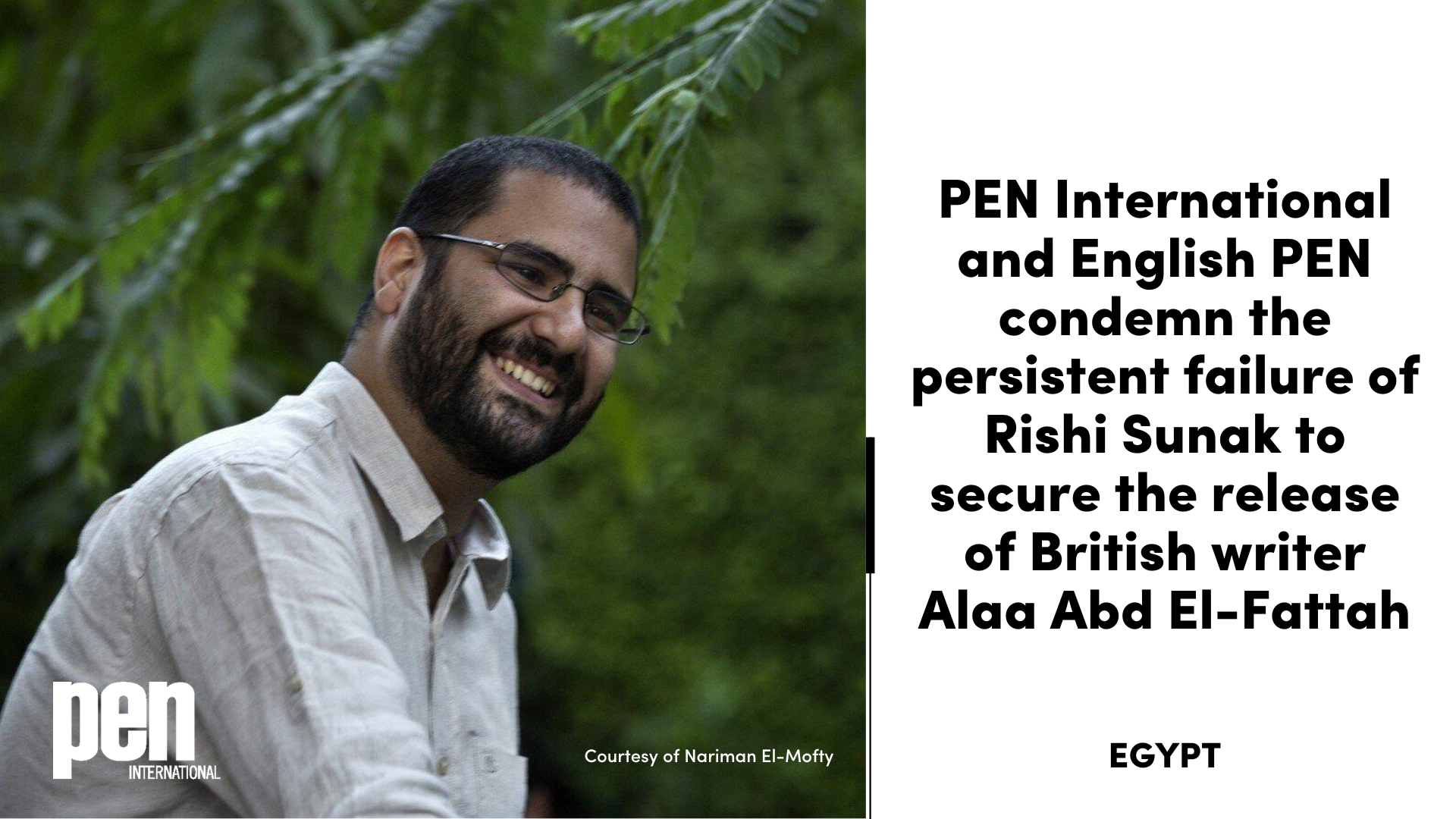Egypt: PEN International and English PEN condemn the persistent failure of Rishi Sunak to secure the release of British writer Alaa Abd El-Fattah
26 July: PEN International and English PEN denounce the persistent failure to secure the release of British-Egyptian writer Alaa Abd El-Fattah by the British government and Prime Minister Rishi Sunak, despite their pledge in 2022 to work ‘hard to secure his release’. The UK’s inability to secure Alaa Abd El-Fattah’s release for over eight months after Sunak's meeting with the Egyptian President in Sharm el-Sheikh is profoundly disappointing.
Despite the family’s relentless campaigning for his right to consular access, the UK government has failed to secure consular visits for Alaa Abd El-Fattah, an arbitrarily detained British writer who faced an unfair trial, and was tortured and ill-treated in prison. We repeat our call on the UK Government to uphold its pledge and take all necessary actions to end Alaa Abd El-Fattah’s ordeal and ensure his freedom.
Last week, Egyptian human rights advocates Mohamed Baker and Patrick Zaki were granted presidential pardons following intensive international pressure, a day after an unjust three-year sentence was handed down by the Emergency State Security Court against Zaki. Human rights lawyer Mohamed Baker was arrested while defending Abd El-Fattah before the State Security Prosecution (SSSP) in September 2019.
Both faced similar charges and were unfairly sentenced by the same Emergency Court to five and four years, respectively. While the presidential pardons and the subsequent release of Baqer and Zaki indicate the efficacy of international pressure, they also highlight the ineffectiveness of the actions thus far undertaken by the UK government to secure Abd El-Fattah’s release, a British citizen.
Although the UK government stated on 21 June 2022 that they were “working hard to secure Alaa Abd El Fattah’s release” and have pledged to raise the case with the Egyptian authorities on several occasions, PEN International and English PEN are concerned that no tangible progress appears to have since been made.
Despite minimal improvements in his prison conditions since his transfer to a new prison in May 2022, Abd El-Fattah is still denied access to a lawyer and UK consular visits. On 24 August 2022, his family reported that the prison authorities restricted Abd El-Fattah’s access to clean clothing and writing materials. In November, PEN International raised grave concerns over Alaa Abd El-Fattah’s health following his decision to escalate his hunger strike to protest his unjust imprisonment.
We urge on the UK Government to do all in their power to to provide a consular visit at the earliest possible opportunity and secure the release of British Egyptian writer Alaa Abd El-Fattah.
Background
Alaa Abd El-Fattah is a British-Egyptian citizen, an award-winning writer and software developer, and an Honorary Member of English PEN. He is serving a retaliatory five-year prison sentence in Egypt following a grossly unfair trial before The Emergency State Security Court. The sentence, handed down in December 2021, has been widely condemned by leading international human rights organisations, including PEN International, Amnesty International, the Committee to Protect Journalists, and Human Rights Watch.
According to his family, Abd El-Fattah has been subjected to torture and ill-treatment in detention on multiple occasions since his imprisonment. The Egyptian authorities have failed to adequately investigate Abd El-Fattah’s allegations of torture and ill-treatment, despite a series of complaints filed by him and his family since September 2019. For over two years, he was denied access to basic necessities, including a mattress, bed sheets, books, and newspapers.
Abd El-Fattah is still denied access to a lawyer and UK consular visits and is prevented from accessing necessities, including medication such as blood glucose and blood pressure monitors. On 1 November 2022, Abd El-Fattah’s family announced that he decided to escalate his hunger strike, which began in April 2022, to protest his arbitrary imprisonment and detention conditions. He spent more than six months on hunger strike, and concerns for his health and life were mounting for months.
Egyptian authorities maintain a harsh crackdown on freedom of expression, expanding online censorship, curtailing press freedom, and widening the use of counter-terrorism legislation and “fake news” charges to silence critics. Hundreds of independent news, politics, and human rights websites are blocked in Egypt, while press freedom faces unprecedented challenges. PEN International documented several cases of writers, poets, journalists, and bloggers arbitrarily arrested and faced unfair trials for peacefully expressing their opinions. Many face discriminatory treatment and extra punitive and arbitrary measures in jail, including inadequate access to medical care.

